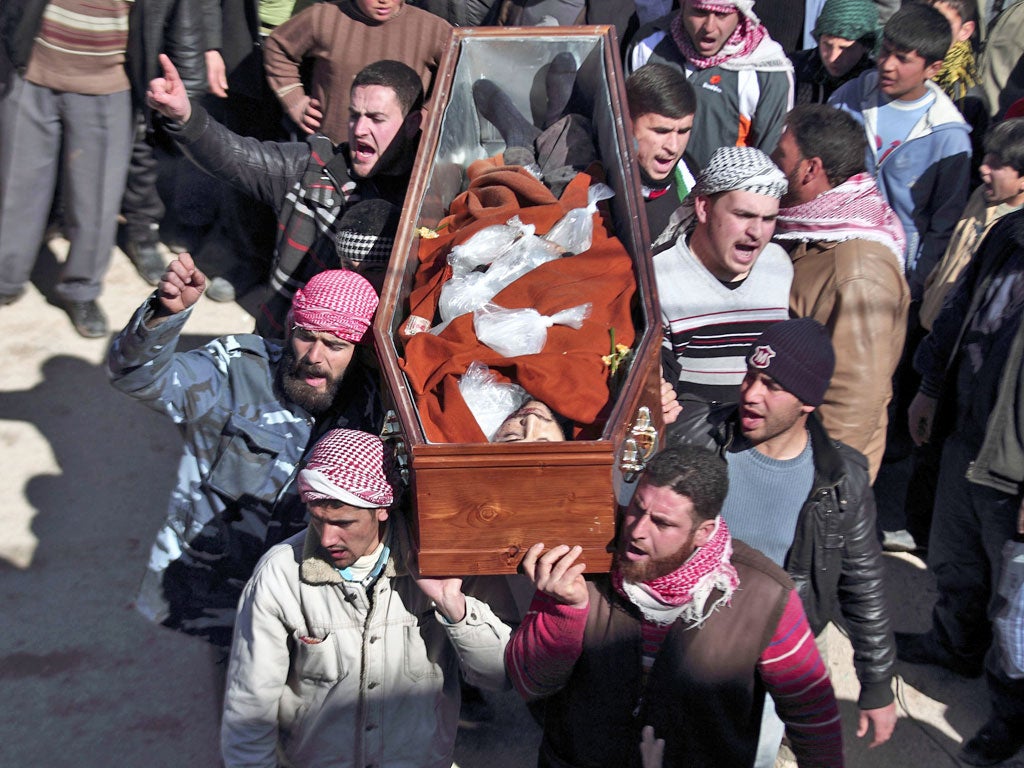Thousands in Homs fear Assad's retribution as rebel army retreats
Residents of Syria's besieged city await their fate after fighters are forced to withdraw

Your support helps us to tell the story
From reproductive rights to climate change to Big Tech, The Independent is on the ground when the story is developing. Whether it's investigating the financials of Elon Musk's pro-Trump PAC or producing our latest documentary, 'The A Word', which shines a light on the American women fighting for reproductive rights, we know how important it is to parse out the facts from the messaging.
At such a critical moment in US history, we need reporters on the ground. Your donation allows us to keep sending journalists to speak to both sides of the story.
The Independent is trusted by Americans across the entire political spectrum. And unlike many other quality news outlets, we choose not to lock Americans out of our reporting and analysis with paywalls. We believe quality journalism should be available to everyone, paid for by those who can afford it.
Your support makes all the difference.Civilians living in the shell-ravaged Homs neighbourhood of Baba Amr appeared to be at the mercy of advancing government troops last night after rebel fighters announced they were withdrawing from the area due to the catastrophic humanitarian situation and dwindling supplies of ammunition.
Click HERE to view 'Death in Syria: The centres of violence' graphic
Late last night, a Syrian official said the army had entered and taken control of the neighbourhood.
The retreat came as members of the UN Security Council - including Russia and China - released their first statement on the situation in Syria for seven months, saying they "deplore" the rapidly deteriorating security situation. Syria's alliances with Beijing and Moscow has until now hampered any decisive action by the council. Yesterday's statement urged President Bashar al-Assad's government to allow the UN humanitarian aid chief Baroness Amos to enter the country immediately.
Shortly after the withdrawal of the Free Syrian Army (FSA), which has been the sole line of defence between the remaining 4,000 residents and a relentless barrage of rocket and tank-fire during the 26-day siege of the city, Mr Assad's government gave permission for the International Committee of the Red Cross to enter the war-torn neighbourhood. Snow prevented aid trucks from reaching the city yesterday, but they are expected to be allowed to enter today.
The FSA said its withdrawal was "strategic" and aimed at protecting the 4,000 residents who had decided to stay in Homs. Yet in a sign of the dangers posed by Mr Assad's troops, the FSA issued a plea to Baathist generals not to harm the civilians of Baba Amr and threatened a "severe response" if innocent residents are harmed.
But with one Syrian official saying this week that troops were planning to "cleanse" the area following their assault, there are fears among activists that Mr Assad's soldiers might exact a terrible revenge for the FSA's resistance. "If the international community isn't able to protect us or send in humanitarian aid, we ask them to send in burial shrouds to bury our children," an activist calling himself Abu Abdo told the rights group Avaaz.
In Damascus, activists claimed that security forces opened fire on a demonstration against Assad, injuring five young men. "We went out to prove that the occupation of Baba Amr will not put down the revolution in Syria ," Abu Abdallah, one of the demonstrators, told Reuters.
As residents of Homs waited nervously, it was reported last night that wounded French freelance journalist Edith Bouvier arrived in Lebanon from Syria, along with French photographer William Daniels. Ms Bouvier was injured during heavy shelling of Baba Amr which killed veteran Sunday Times war correspondent Marie Colvin and French photographer Remi Ochlik last week. Last night, a Syrian activist posted a video online that he said showed the burial of Ms Colvin on Monday.
Yesterday's withdrawal came as the Syrian National Council (SNC), the country's main political opposition, announced the creation of a military wing to channel arms and funding to FSA rebels fighting Mr Assad's forces.
"We want all the armies inside Syria to be under the control of one organisation," Walid al-Buni, the director of foreign relations at the SNC, said. "After Bashar al-Assad we don't want the country to descend into civil war."
But the move, an attempt by the SNC leader Burhan Ghalioun to unite the group's disparate factions - appeared to have backfired in embarrassing fashion last night when the leading FSA commander said he had not rubber-stamped the project.
"I have no idea what Burhan Ghalioun is talking about," Colonel Riad al-Asaad told The Independent. "I am very upset, because he informed the whole world about this, but the FSA never heard anything about it." One senior SNC source told The Independent that yesterday's scheme was an attempt by Mr Ghalioun to shore up his position and cover widening cracks within the group.
Last week Saudi Arabia's Foreign Minister, Prince Saud al-Faisal, voiced his support for arming the Syrian opposition, while yesterday Kuwaiti MPs passed a resolution calling on the government to channel weapons to the FSA.
Britain closes embassy over security threat
Britain has closed its embassy in Damascus and withdrawn its staff, a move that some have criticised for removing a vital means of scrutinising the Syrian regime.
Ambassador Simon Collis and staff left the country on Wednesday, Foreign Secretary William Hague said yesterday. "The deterioration of the security situation in Damascus puts embassy staff and premises at risk," Mr Hague said.
Chris Doyle, director of the Council for Arab-British Understanding, said: "Now the regime has no monitors, no journalists and fewer diplomats to worry about, Bashar al-Assad can escalate his rampage of killing and destruction."
Join our commenting forum
Join thought-provoking conversations, follow other Independent readers and see their replies
Comments